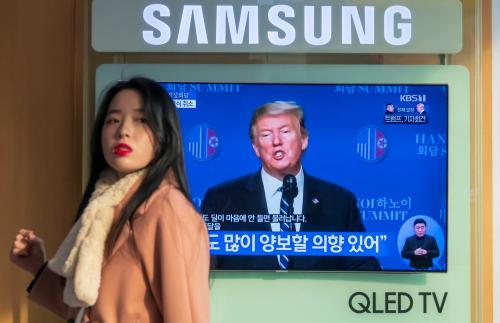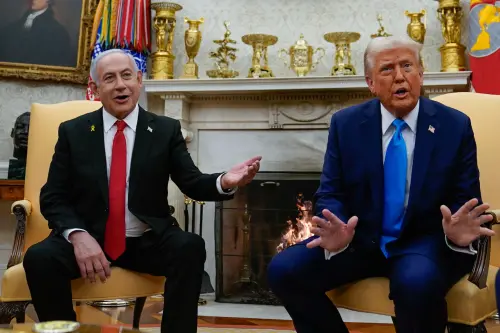This piece is part of the Taiwan-U.S. Quarterly Analysis series, which features the original writings of experts with the goal of providing a range of perspectives on developments relating to Taiwan.
To what extent has America’s reputation changed since Donald Trump took office for a second term? Taiwan and South Korea, two of the United States’ most important partners in the region, have paid painstakingly close attention to how the United States, its global leadership, and its role in the region has changed from the Biden administration to the Trump administration. The stakes for these two places have never been higher. Since Trump’s election, Taiwan has faced a potential domestic constitutional crisis and an increase in threats of war from the People’s Republic of China. Meanwhile, South Korea faced a coup by former President Yoon Suk Yeol and has struggled with leadership since then, while its authoritarian neighbor to the north continues to expand its military capabilities and exacerbate tensions on the Korean Peninsula. Both places, however, face changing relationships with the United States under the new Trump administration, defined by relative uncertainty and unpredictability. Both Taiwan and South Korea rely on the United States diplomatically, militarily, and economically in order to maintain their relative peace and stability. Understanding how these two places see the United States under Trump’s leadership has never been a more pressing question.
In July 2024, during the U.S. presidential election cycle, we conducted a survey of 1,500 voters in Taiwan and South Korea asking a series of questions about the United States, its leadership, and whether they see the United States as a trustworthy partner. From February to April of 2025, we redid the survey with 2,000 participants in Taiwan and South Korea asking the same questions, along with new questions about Trump.
Our findings paint a bleak picture of America’s future relations with South Korea and Taiwan. Across almost all measures, the United States is seen as a less reliable partner, Taiwan and South Korea both feel less confident that the United States will assist them in the event of a conflict with their respective authoritarian neighbor, and both see Trump as bad for democracy around the world.
Is the United States a trustworthy partner?
Both Taiwanese and South Korean citizens believe that the United States is less trustworthy now than a year ago, when Joe Biden was president. Perceptions of the United States’ reliability have been trending downward for years in both Taiwan and South Korea. For instance, multiple scholars have tracked how Taiwanese respondents to the question “Do you believe the United States is a trustworthy ally” have felt more pessimistic since the war in Ukraine began in 2022.
Similarly, under the Trump administration, respondents in Taiwan and South Korea also feel less confident that the United States will support them in the event of a military conflict with China and North Korea, respectively. Only 37.5% of respondents in Taiwan believed in March 2025 that it is “likely” or “very likely” that the United States would intervene in a military conflict, down from 44.5% in July 2024. This question has never been direr for Taiwan. Multiple political science research papers suggest that Taiwanese are significantly more willing to participate in the island’s defense in a military conflict with China if they believe the United States will participate as well. If perceptions that the United States will not help Taiwan increase, it will have major ramifications for how civil society will respond in the event of a military conflict over Taiwan.
South Koreans also exhibit a similar declining perception of the likelihood of U.S. assistance in the event of a war with North Korea. Although Trump has not recently mentioned whether the U.S. troop presence in South Korea will change during his tenure, he has previously threatened to withdraw U.S. troops from the country, particularly during his 2024 presidential campaign. Pulling U.S. troops from South Korea would have knock-on effects on perceptions of American reliability in the region. Still, a comparison of the two suggests that South Koreans still have more trust in the United States than Taiwanese. This may be because each country’s security relationship with the United States differs in nature: South Korea is a treaty ally whereas Taiwan is not. While public confidence in U.S. defense commitments is lower in both countries in part due to the Trump factor, overall levels of confidence may still be higher in South Korea due to the presence of formal security guarantees.
Trump’s reputational cost
Beyond perceptions of partnership and military support, overall attitudes toward the United States have also decreased. Positive perceptions of the United States as a country, and of U.S.-Taiwan and U.S.-South Korean relations, are down significantly relative to July 2024. For example, the proportion of respondents who viewed the United States either very positively or positively decreased by 20.8% in Taiwan and 14.4% in South Korea as of April 2025, as shown in the figure below.
How do people feel about Trump?
We also asked respondents how much they agreed with two questions about Trump: “I feel my country is safer than before with Trump as president,” and “I feel democracy around the world is stronger than before with Trump as the U.S. president.” In both Taiwan and South Korea, agreement with these statements is incredibly low.
Why does it matter that these two places have low opinions of Trump? Beyond the broader reputational cost to the United States that has come with his new administration, this signals a deeper sense of global insecurity. Under his leadership, people in Taiwan and South Korea may feel less secure and may no longer see the United States as a reliable defender of peace and democracy. This lower perception of the United States has serious implications for whether and how Taiwanese and South Koreans may act in the event of a conflict with China or North Korea. It may also affect how voters in these places support their governments’ foreign policies toward the United States in the future.
Partisanship in Taiwan and South Korea
Those who follow Taiwanese and South Korean politics will undoubtedly know that there is severe polarization in both places. It is worth asking how partisans feel about all three sets of questions discussed above.
For example, in Taiwan, there is a clear partisan divide over the question of whether America is a trustworthy ally. We find that Democratic Progressive Party (DPP) supporters are significantly more likely to view the United States as a trustworthy partner than Kuomintang (KMT), Taiwan People’s Party (TPP), or independent voters. About 50% of DPP supporters view the United States as a trustworthy or a very trustworthy partner, while only 3% of KMT supporters, 10% of TPP supporters, and 14% of independents share the same sentiment. However, even among DPP voters, we still see a 14% decline over the span of eight months.
Our data show that President Lai Ching-te’s DPP remains the most optimistic about the United States, but the overall trend of declining faith in the United States among Taiwanese signals a growing partisan disconnect between the current ruling party and the rest of Taiwanese voters. Although, officially, all major parties in Taiwan express their deep support for U.S.-Taiwan relations, there is a disconnect between how DPP versus non-DPP Taiwanese voters see Taiwan’s most critical geopolitical partner.
There is also a significant difference in South Koreans’ support for the United States based on party affiliation. Conservatives are much more likely to view the United States positively and more likely to trust and show favorability toward the U.S.-South Korea alliance. For example, 69.2% of conservative respondents viewed the United States as either very trustworthy or trustworthy while only 36.4% of progressive respondents felt the same, revealing a stark contrast by party affiliation. More interestingly, only 6% of progressive respondents believe South Korea is safer under Trump relative to 20% of conservative respondents. Only 5.5% of progressive respondents believe that democracy has strengthened under Trump relative to 21.2% of conservative respondents.
The Trump administration’s policy choices are impacting public opinion in Taiwan and South Korea. In the span of a few months, attitudes toward the United States in both Taiwan and South Korea have become more negative. Still, the United States continues to be the most important partner for Taiwan and South Korea. Whether and how leaders in Washington, Taipei, and Seoul manage these shifts will inform the direction of America’s relations with Taiwan and South Korea moving forward.
The Brookings Institution is committed to quality, independence, and impact.
We are supported by a diverse array of funders. In line with our values and policies, each Brookings publication represents the sole views of its author(s).









Commentary
The Trump effect on public attitudes toward America in Taiwan and South Korea
April 25, 2025